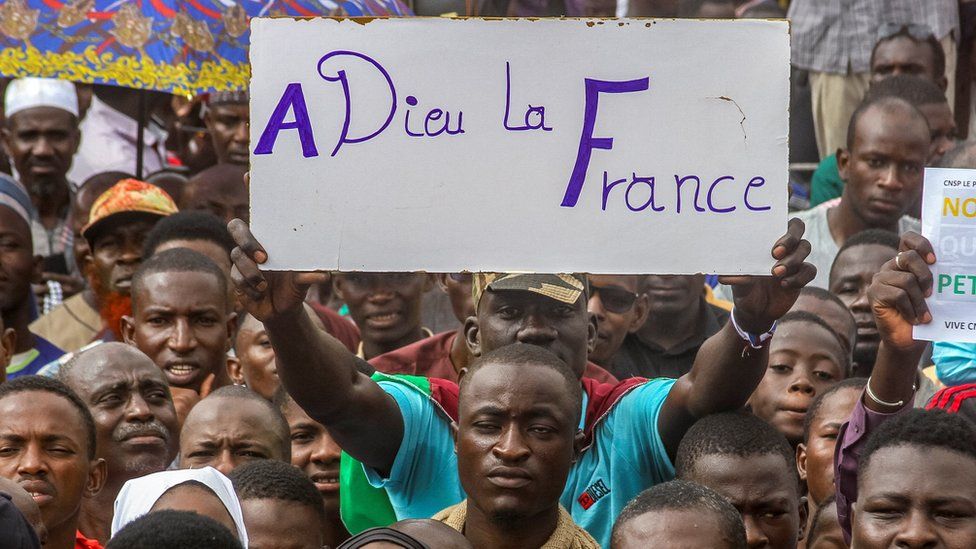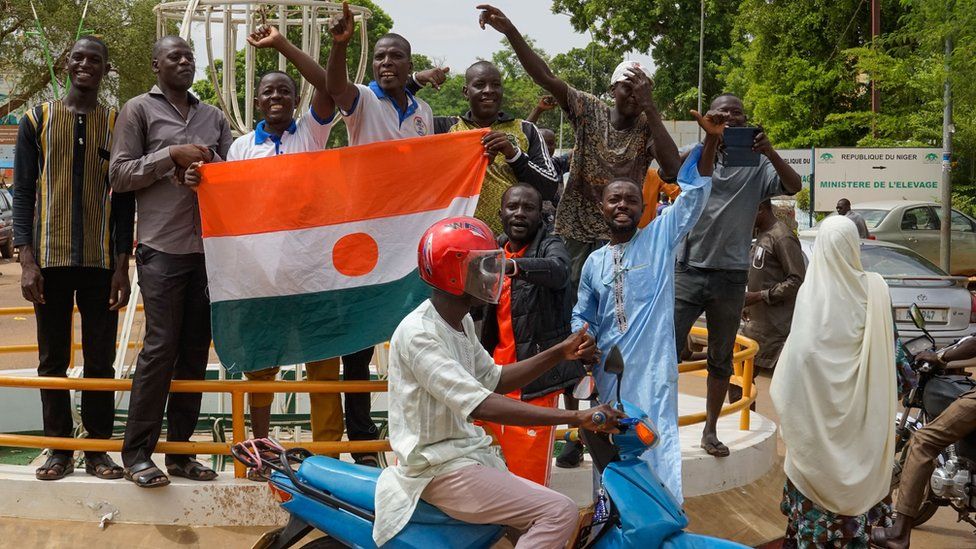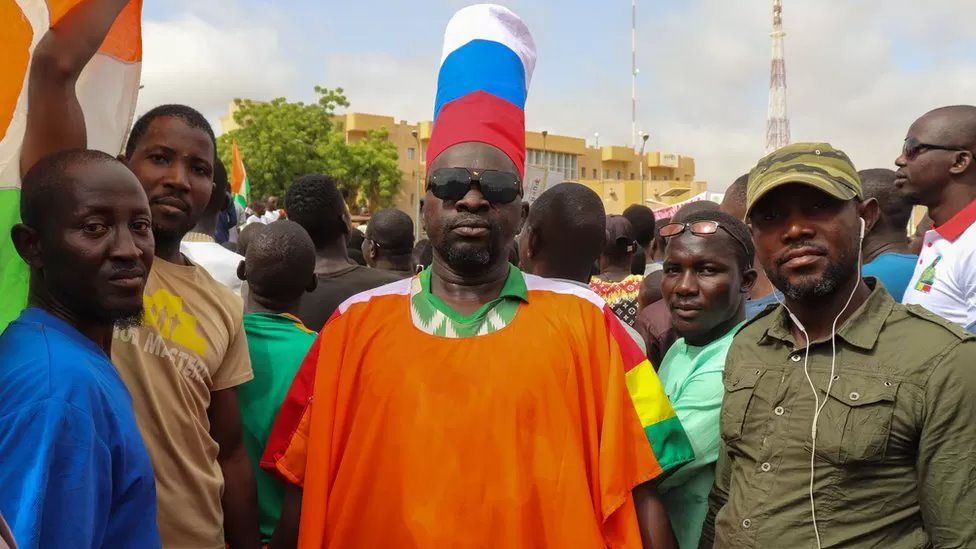風蕭蕭_Frank
以文會友尼日爾政變:法國應該為西非的不穩定負責嗎?
https://www.bbc.com/news/world-africa-66406137
2023 年 8 月 5 日,
尼亞美遊行期間,一名男子舉著政變支持者舉著的標語牌“再見法國”。
作者:Leonard Mbulle-Nziege 和 Nic Cheeseman
非洲分析師
尼日爾成為西非繼布基納法索、幾內亞、馬裏和乍得(所有前法國殖民地)之後最新一個由軍隊奪取控製權的國家。 自 1990 年以來,撒哈拉以南非洲發生的 27 起政變中,驚人的 78% 發生在法語國家,這導致一些評論家質疑法國——或者法國殖民主義的遺產——應該受到指責嗎?
許多政變策劃者肯定希望我們這麽認為。 2022 年 9 月被馬裏軍政府任命為總理的阿卜杜拉耶·梅加上校對法國發起了嚴厲的攻擊。
梅加批評“新殖民主義、居高臨下、家長作風和報複性政策”,聲稱法國“否認普世道德價值觀”,並在馬裏“背後捅刀子”。
布基納法索的反法刻薄言論也十分猖獗,軍政府於二月份終止了一項允許法國軍隊在該國開展行動的長期協議,給了法國一個月的時間撤軍。
在與兩國接壤的尼日爾,有關總統穆罕默德·巴祖姆是法國利益傀儡的指控被用來合法化他的下台,自那以後,阿卜杜拉赫馬內·查尼將軍領導的軍政府撤銷了與法國的五項軍事協議。 部分原因是政變之後引發了民眾抗議和對法國大使館的襲擊。
曆史記錄為這些不滿提供了一些支持。 法國殖民統治建立的政治製度旨在榨取寶貴的資源,同時使用鎮壓策略來保持控製。
英國殖民統治也是如此,但法國在非洲的作用的獨特之處在於,法國在獨立後繼續參與(批評者會說幹預)其前領土的政治和經濟。
西非九個法語國家中的七個仍然使用與歐元掛鉤並由法國擔保的非洲金融共同體法郎作為其貨幣,這是法國對其殖民地經濟政策的遺產。
法國還簽署了防務協議,定期代表不受歡迎的親法領導人進行軍事幹預,以維持他們的權力。
尼日爾示威者還譴責政變後實施經濟製裁的鄰國
在許多情況下,這加強了乍得前總統伊德裏斯·代比和布基納法索前總統布萊斯·孔波雷等腐敗和濫用職權人士的勢力,為爭取民主的鬥爭帶來了額外的挑戰。
盡管法國沒有進行軍事幹預以恢複最近被廢黜的任何國家元首的職務,但所有這些國家元首都被視為“親法”。
更糟糕的是,法國政治領導人與其非洲盟友之間的關係常常腐敗,以犧牲非洲公民的利益為代價創造了強大而富有的精英階層。
法國著名經濟學家弗朗索瓦-澤維爾·韋爾沙夫(François-Xavier Verschave)創造了“法蘭西非洲”(Françafrique)一詞,指的是“法國政治和經濟高層的秘密犯罪行為”所隱藏的新殖民關係。 他聲稱,這些關係導致大量資金被“挪用”。
盡管最近幾屆法國政府試圖與法國保持距離,但法國、法國商業利益和非洲之間的關係問題不斷提醒人們,其中包括一些令人尷尬的腐敗案件。
因此,很容易理解為什麽一位尼日爾人告訴英國廣播公司:“從童年起,我就一直反對法國……他們剝削了我國家的所有財富,例如鈾、石油和黃金。”
此類醜聞常常被掩蓋起來,而法國的非洲政治盟友很強大,而且法國的軍事支持有助於維持穩定。
近年來,法國和其他西方國家確保秩序的能力不斷惡化,越來越容易受到批評。
盡管有大量資金和軍隊,但法國領導的國際社會對薩赫勒地區伊斯蘭叛亂的反應未能使西非各國政府重新控製其領土。
這對布基納法索和馬裏文職領導人的命運尤其重要,因為他們無法保護自己的公民,給人留下了法國的支持更多是一種負擔而不是一種祝福的印象。
反過來,民眾日益增長的憤怒和挫敗感也讓軍事領導人更加大膽地相信,公民會慶祝政變。
然而,盡管法國多年來在與非洲前殖民地打交道時犯了很多錯誤,但法語國家目前所經曆的不穩定並不能完全歸咎於法國。
它並不是唯一一個支持海外獨裁領導人的前殖民國家。 尼日爾遊行中的一群支持軍事的示威者
一些反對法國介入尼日爾的人轉而表示支持俄羅斯
在冷戰的黑暗日子裏,英國和美國幫助支持了許多獨裁者以換取他們的忠誠,從肯尼亞的丹尼爾·阿拉普·莫伊到當時的紮伊爾(現在的剛果民主共和國)的蒙博托·塞塞·塞科 。
政變與前殖民國家之間的密切關係在以前的時代也不那麽普遍。 自 1952 年以來發生政變次數最多的四個國家是尼日利亞(8 次)、加納(10 次)、塞拉利昂(10 次)和蘇丹(17 次),這些國家都經曆過英國統治。
雖然法語國家最近的政變趨勢可能反映了法非的後遺症,但西非和薩赫勒地區部分地區“前所未有”的不安全程度也支撐了這一趨勢,“武裝團體、暴力極端分子和 聯合國表示,“犯罪網絡”破壞了公眾對文職政府的信心。
過去三年的每一次政變都是由一係列特定的國內因素推動的,這些因素表明了非洲政治和軍事領導人的作用。
在馬裏,政變的背景包括2011年利比亞國家崩潰後極端主義勢力湧入、總統操縱地方選舉的指控以及反對黨在首都策劃的大規模反政府抗議活動。
尼日爾政變的導火索似乎是巴祖姆總統計劃改革軍事最高指揮部並罷免特基亞尼將軍的職務。
這有力地表明,政變的真正目的並不是為了加強尼日爾主權或援助該國最貧窮的公民,而是為了保護軍事精英的特權。
最近政變的複雜動機充分體現在許多新軍政府試圖用另一種外部盟友取代一種有問題的關係的速度上。
最近在聖彼得堡舉行的俄羅斯-非洲峰會上,布基納法索和馬裏領導人宣布支持弗拉基米爾·普京總統和入侵烏克蘭。
與過去一樣,這些全球聯盟的受益者很可能是政治精英,而不是普通公民。 已有報道稱,5月份,瓦格納集團的部隊與當時的普京政府結盟,在馬裏反叛亂行動中對數百名平民實施酷刑和屠殺。
因此,減少法國的影響力不太可能直接促進政治穩定,而且在未來幾十年裏,我們很可能會看到新一代軍事領導人試圖將進一步的政變合法化,因為需要使本國擺脫俄羅斯的惡意影響。
Leonard Mbulle-Nziege 是非洲風險谘詢公司 (ARC) 的研究分析師,Nic Cheeseman 是伯明翰大學選舉、民主、問責和代表中心的主任。
Niger coup: Is France to blame for instability in West Africa?
https://www.bbc.com/news/world-africa-66406137
 "Goodbye France," reads a placard held by supporters of the coup
"Goodbye France," reads a placard held by supporters of the coup
Niger has become the latest country in West Africa where the army has seized control, following Burkina Faso, Guinea, Mali, and Chad - all former French colonies. Since 1990, a striking 78% of the 27 coups in sub-Saharan Africa have occurred in Francophone states leading some commentators to ask whether France - or the legacy of French colonialism - is to blame?
Many of the coup plotters would certainly like us to think so. Colonel Abdoulaye Maiga, who was named prime minister by the military junta in Mali in September 2022, launched a scathing attack on France.
Criticising "neocolonialist, condescending, paternalist and vengeful policies", Mr Maiga alleged that France had "disowned universal moral values" and stabbed Mali "in the back".
Anti-French vitriol has also flourished in Burkina Faso, where the military government ended a long-standing accord that allowed French troops to operate in the country in February, giving France one month to remove its forces.
In Niger, which neighbours both countries, allegations that President Mohamed Bazoum was a puppet for French interests were used to legitimise his removal from power, and five military deals with France have since been revoked by the junta led by Gen Abdourahmane Tchiani. Partly as a result, the coup was followed by popular protests and attacks on the French embassy.
The historical record provides some support for these grievances. French colonial rule established political systems designed to extract valuable resources while using repressive strategies to retain control.
So did British colonial rule, but what was distinctive about France's role in Africa was the extent to which it continued to engage - its critics would say meddle - in the politics and economics of its former territories after independence.
Seven of the nine Francophone states in West Africa still use the CFA franc, which is pegged to the euro and guaranteed by France, as their currency, a legacy of French economic policy towards its colonies.
France also forged defence agreements that saw it regularly intervene militarily on behalf of unpopular pro-French leaders to keep them in power.

In many cases, this strengthened the hand of corrupt and abusive figures such as Chad's former President Idriss Déby and former Burkinabe President Blaise Compaoré, creating additional challenges for the struggle for democracy.
Although France did not intervene militarily to reinstate any of the recently deposed heads of state, all were seen as being "pro-French".
Worse still, the relationship between French political leaders and their allies in Africa was often corrupt, creating a powerful and wealthy elite at the expense of African citizens.
François-Xavier Verschave, a prominent French economist, coined the term Françafrique to refer to a neocolonial relationship hidden by "the secret criminality in the upper echelons of French politics and economy". These ties, he alleged, resulted in large sums of money being "misappropriated".
Although recent French governments have sought to distance themselves from Françafrique, there are constant reminders of the problematic relations between France, French business interests and Africa, including a number of embarrassing corruption cases.
It is therefore easy to understand why one Nigerien told the BBC that: "Since childhood, I've been opposed to France… They've exploited all the riches of my country such as uranium, petrol and gold."
Such scandals were often swept under the carpet while France's African political allies were strong, and France's military support helped to maintain stability.
In recent years, the ability of France and other Western states to ensure order has deteriorated, leaving them increasingly vulnerable to criticism.
Despite considerable funding and troops, the French-led international response to Islamist insurgencies in the Sahel region has failed to enable West African governments to regain control of their territories.
This was particularly significant to the fate of civilian leaders in Burkina Faso and Mali because their inability to protect their own citizens created the impression that French support was more of a liability than a blessing.
In turn, growing popular anger and frustration emboldened military leaders to believe that a coup would be celebrated by citizens.
Yet, for all of the mistakes France has made in its dealings with its former colonies in Africa over the years, the instability Francophone states are currently experiencing cannot be solely laid at its door.
It has hardly been the only former colonial power to prop up authoritarian leaders abroad. 
During the dark days of the Cold War, the UK and the United States helped prop up a number of dictators in return for their loyalty, from Daniel arap Moi in Kenya to Mobutu Sese Seko in what was then Zaire, now the Democratic Republic of Congo.
The strong relationship between coups and the former colonial power was also much less prevalent in previous eras. Four of the countries that have seen the highest number of coup attempts since 1952 are Nigeria (8), Ghana (10), Sierra Leone (10), and Sudan (17), which all experienced British rule.
While the recent trend of coups in Francophone states may reflect the legacy of Françafrique coming home to roost, it has also been underpinned by "unprecedented" levels of insecurity in parts of West Africa and the Sahel region, with "armed groups, violent extremists and criminal networks" undermining public confidence in civilian governments, according to the UN.
Each of the coups over the last three years has also been driven by a specific set of domestic factors that demonstrate the agency of African political and military leaders.
In Mali, the background to the coup included an influx of extremist forces following the the collapse of the Libyan state in 2011, allegations the president had manipulated local elections, and mass anti-government protests orchestrated by opposition parties in the capital.
The trigger for the coup in Niger appears to have been President Bazoum's plans to reform the military high command and remove Gen Tchiani from his position.
This is a strong indication that the coup was not really intended to strengthen Nigerien sovereignty, or to aid the country's poorest citizens, but rather to protect the privileges of the military elite.
The mixed motives of recent coups are well demonstrated by the speed with which many of the new military governments have sought to replace one problematic relationship with an external ally with another.
At the recent Russia-Africa summit in St. Petersburg, leaders from Burkina Faso and Mali declared their support for President Vladimir Putin and the invasion of Ukraine.
As in the past, the beneficiaries of these global alliances are likely to be the political elite rather than ordinary citizens. There are already reports that in May, troops from the Wagner group, in alliance with Putin's government at the time, were responsible for the torture and massacre of hundreds of civilians in Mali as part of anti-insurgency operations.
Reducing French influence is therefore unlikely to be a straightforward boon for political stability, and in decades to come we may well see a new generation of military leaders attempting to legitimise further coups on the basis of the need to rid their countries of malign Russian influence.
Leonard Mbulle-Nziege is a research analyst at Africa Risk Consulting (ARC) and Nic Cheeseman is the director of the Centre for Elections, Democracy, Accountability and Representation at the University of Birmingham.





